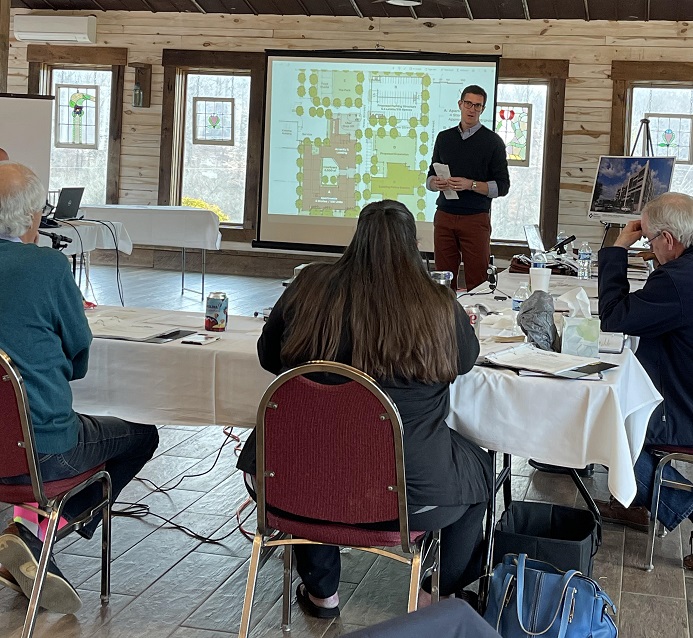
BY MIKE FUHRMAN & STACIE LETT CAIN
After years of delaying major capital projects because of stagnant property tax revenues, Statesville officials are increasingly optimistic that they will have millions of additional dollars to invest in new facilities — and in city employees — during the coming years.
During their annual planning retreat Thursday, Statesville council members learned that the city’s tax base has grown by up to 30 percent over the past four years. City Manager Ron Smith delivered the news to the council, stressing that projection was a best-case scenario based on estimates by Iredell County officials.
Assuming that the city council maintains the current property tax rate of 54.78 cents per $100 of appraised value, the exponential growth in the tax base would drive a significant increase in tax revenues for city coffers over the next four years,
If the current tax rate is maintained, the city would take in about $25 million in property tax revenues in 2023-2024, an increase of about $5.5 million over the current fiscal year, city officials said.
The city manager told the council that the increase in revenues would help the city deal with inflation, which has driven up costs for construction, equipment and vehicles, and the cost of providing health insurance for city employees. As result, many city employees — 15 percent in the past year — are leaving for higher-paying jobs and better working conditions.
“Everything is up 20 to 40 percent,” Smith said. “We’re just like private industry. We need to figure out how to do it.”
IMMEDIATE NEEDS
The city has a long list of needs — from equipment and building projects to improving employee compensation — that could be at least partially funded by the additional tax revenues, Smith told council.
For starters, the council has already committed about $1 million to pay for increases for police officers in an effort to slow the exodus of officers to nearby agencies that offer better higher pay.
If the council eliminates the solid waste fee on July 1, the city could use the additional property tax revenues to offset that $600,000 loss in revenue.
Another $300,000 would be needed to fund implementation of the next phase of the city’s pay study, which aims to keep city employees’ salaries competitive with other municipalities and counties in the region.
In an effort to offset inflation, the city manager also told the council that he would likely recommend an 8 percent cost-of-living raise for employees in the 2023-2024 budget. That across-the-board pay bump would cost the city about $1.5 million, according to city officials.
Council could also use the additional tax revenues to fund some new positions in the coming fiscal year. While senior staff has requested the creation of 22 new positions, the city manager said he would not recommend the council fund all of those positions.
Smith said he would also present the council with an additional proposal to increase pay for city firefighters.
Chief Andy Weatherman told council members the SFD will be down eight positions in February, following the resignations of two more firefighters.
The starting salary for Statesville firefighters is $34,800. That figure lags other regional departments, which offer starting pay averaging $45,000 for firefighters, city officials said.
LONG-TERM DEBT PLAN
Council members also heard a presentation from Davenport Public Finance about the city’s capacity for financing capital needs through existing fund balance and the issuance of long-term debt.
With only $1.5 million in outstanding tax-supported debt, the city has the capacity to borrow and repay a significant amount of money to fund equipment and infrastructure needs.
Council is tentatively planning to borrow about $12 million to purchase a new garbage truck and fund construction of the new Fire Station 1 and Operations Center. The total estimated cost for those projects is $55 million. Some $6 million in ARPA funds and utility revenues are also earmarked to help pay for these projects.
Under conservative financial policies recommended by Davenport representatives, the city could spend $10.8 million in excess fund balance and take on up to $55 million in long-term debt to fund capital projects.
The new influx of property tax revenues would cover the principal and interest on that debt, and the city would be able to continue grow its fund balance, the consultants said.
“If we get $30 million, we’re in fat city,” Councilman Steve Johnson said during a discussion of the city’s capacity for borrowing money to pay for capital projects.
CAPITAL PRIORITIES
After Davenport Public Finance representatives advised council that they could spend down the fund balance and leverage the increase in property tax revenues to borrow money to pay for capital projects, council members discussed a list of 10 needs and wants identified by senior staff and council members. Then they individually ranked them and staff compiled an overall ranking:
- Police Station expansion;
- Construction of Fire Station5;
- Replace City Hall Roof;
- Construct Fire Training Facility;
- Construct new swimming pool;
- Expand greenways;
- McClure Park improvements;
- Land acquisition for new parks;
- Construct replacement Fire Station 2; and
- Construct parking deck
VISION STATEMENT
With the assistance of Centralina Regional Council, city staff and council members continued their work on developing a vision statement for the city. Geraldine Gardner, executive director of Centralina, presented the latest version: “Statesville will be a prosperous regional center that provides a high quality of life for all.”
The consultant will continue working on the vision statement.
“This is the framework upon which goals will be built,” Gardner said. “The simplicity of this statement gives you lots of flexibility.”




I urge the council to be prudent in their decisions and not over-commit. Future real estate values can go down just as easily as they go up. Being in “fat city” is an unfortunate use of words when considering how to spend other people’s hard-earned money.